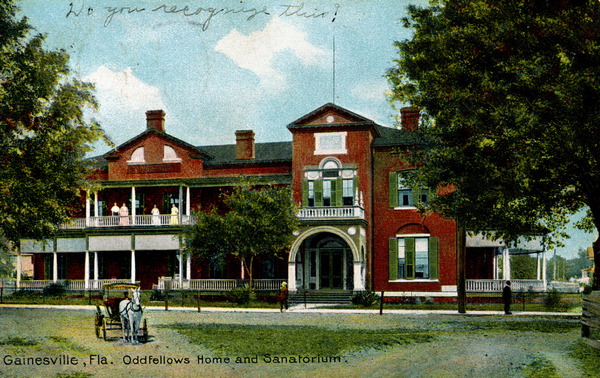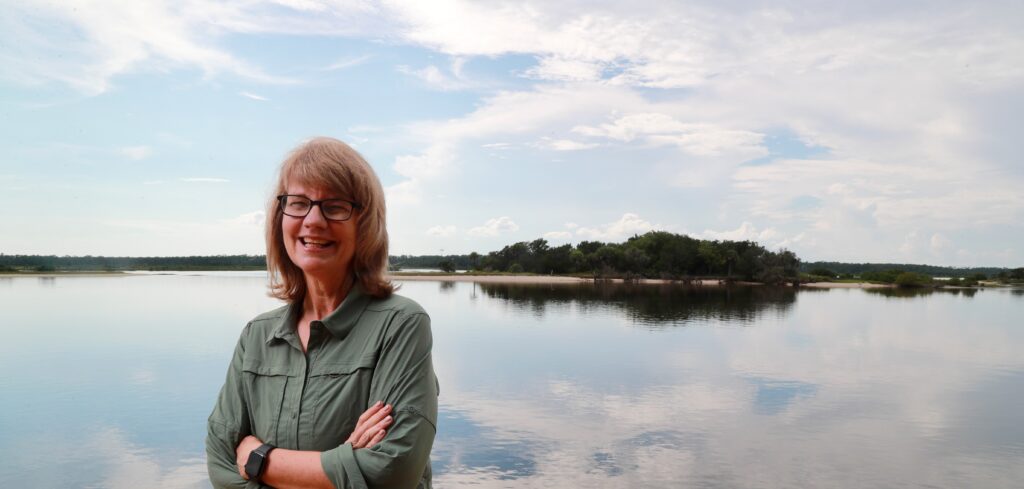Editor’s note: Environmental journalist Cynthia Barnett delivered the following remarks at the Alachua County Climate Summit on Nov. 16 in Gainesville.
By Cynthia Barnett
In June of 1883, a man named Hurlburt set out on a trip from Jacksonville to New Orleans. Back then, the fastest route was to take a train to the bustling city of Cedar Key, then catch a steamboat across the Gulf of Mexico.
Unfortunately for him, the route took Hurlburt through the middle of Alachua County. That summer, North Florida was dealing with devastating outbreaks of smallpox. Alachua County established a quarantine to protect its citizens from the deadly infection — also citing the need to protect the consumptives who flocked here in that era to heal from tuberculosis at springs like Magnesia near Hawthorne.
Lawmen stopped trains at the county line, turning back passengers who had been to infected cities.

Hurlburt was furious. He was a minister and a family man. Palatka had let him through fine. But despite raising a ruckus and spending the night on the platform, he never did get to travel through Alachua County.
He told his story to the Times-Union newspaper of Jacksonville, which was having nothing of Alachua County’s absurd quarantine. Under the headline “Fool’s Paradise,” the paper published a screed to, quote, “let outsiders know that the asses of Alachua County are a peculiar breed, not elsewhere prevalent in Florida.”
It was neither the first nor the last time Alachua County was accused of being “peculiar.” “Asses,” I am not sure about. But it is fair to say that the county became known for its efforts to provide a safe home for those who live here — and a safe harbor for vulnerable people who migrate here … visit here … or live here temporarily.
Those included, at least in the short-lived early promise of Reconstruction, the large population of formerly enslaved people trying to start new lives here after the Civil War. They included the consumptive northerners who recuperated here during TB epidemics. And they included the hundreds of thousands of young people who have made a temporary home here while studying at the University of Florida.
If that makes us a peculiar breed, then I am especially proud to join you — my fellow asses of Alachua County — to launch an action plan for climate change, which endangers our communities, people, ecosystems and infrastructure like few other threats in our history.
We have met many other historic turning points with creativity, foresight and investment, especially when it came to education, public health and environmental protection. But as we confront climate change, it is also worth remembering the times we were on the wrong side of history.
The Reconstruction Era following the Civil War opened with a lot of promise in Alachua County. African Americans purchased farms and launched businesses. The county was known for the best schools in the state for both Black and white children. It was an epicenter of African American political leadership: Josiah Walls, a mayor of Gainesville and Florida’s first Black congressman, and Matthew Lewey, a mayor of Newnansville, judge and state lawmaker, launched Florida’s first biracial political party. Lewey started Florida’s first statewide Black newspaper, The Florida Sentinel.
But a white counter-assault to hold onto the racial hierarchy of the past turned lethal — and ultimately succeeded to disenfranchise Black citizens. The KKK was just one of several white terror organizations to take hold in the county, which had one of the highest rates of lynching in the state, including the 1916 mass lynching in Newberry. In my own profession, news coverage of racial violence was utterly biased, racist and cruel.
These kinds of stories are especially important for us to share and remember now, as state government quashes discussion around race and social justice in the public schools, and even in the curriculum at the University of Florida. When it comes to climate change, too, textbook authors this summer were told to delete references to climate change from science books before they could be accepted for use in Florida’s K-12 public schools.
To be a Floridian, and to be an Alachua County citizen, is to hold profoundly different realities. One moment you swoon at the black-edged wings of a swallow-tailed kite in the most luminous light you’ve ever seen. The next moment you wonder when you’ll be called upon to take a stand for more than the birds and the water, against injustices that may range from a talented climate colleague who has been laid off … to a roundup of immigrant families.
As we work to make Alachua County a safe home and a safe harbor in the face of climate change, I want to leave you with three lessons from our history:
First: Expect the unexpected. One certainty about climate change is the uncertainty it will bring. Stable worlds change. Newnansville, the original county seat, was a bustling settlement in the 1840s. The railroad passed it by, and a great hurricane bore down in September 1896. The following spring, the post office where Matthew Lewey had once served as postmaster shuttered, reopening in Alachua.
At that time, leaders expected the county’s economic center would shift to New Gainesville, a platted town east of Gainesville with a hygienic hotel and TB sanatoriums to draw wealthy northerners for rest cures. The county was home to the largest cotton-shipping station in Florida, and a center of the state’s orange belt with vast groves, according to the journalist Carl Webber’s 1893 book “Eden of the South.” (The subtitle is worth mentioning: “Descriptive of the Orange Groves, Vegetable Farms, Strawberry Fields, Peach Orchards, Soil, Climate, Natural Peculiarities, and the People of Alachua County, Florida.”)
The hygienic hotel and sanatoriums never got built. The orange groves would soon be wiped out by freezes, forcing growers to abandon the county altogether.
What are we counting on today that may not be here tomorrow?
My second lesson from history is to center community, for that’s where we do our most authentic good. Talking about climate change with your neighbors here in a college hall, or in churches, fraternal organizations or at free yoga on the plaza, you will connect in ways you can’t on social media, where misinformation now spreads 10 times faster than credible reporting.
From enhanced green spaces to community gardens, many of the climate solutions being proposed by the county and Gainesville build human connections as they solve climate problems. They deserve special emphasis. I want to suggest that young people in our county also deserve special emphasis given efforts to sanitize the climate story from their schoolbooks.
Third, last and most importantly, the past cries out for us to choose the right side of history.

This means continued work to undo the legacy of segregation that to this day burdens our neighbors in East Gainesville with unjustly high energy costs. It means preparing for the wave of climate migrants already moving to Alachua County as Floridians displaced by storms and sea rise continue to flee the coasts. It means ensuring that non-English speakers gain better access to emergency information in hurricanes and other disasters.
As you conceptualize climate action, keep the right side of history at the forefront. The climate-conscious strategies in the county and city’s plans take vulnerable people into account. They take vulnerable infrastructure into account. They take vulnerable ecosystems into account, with a call to protect a third of our land and water by 2030.
With your help, these strategies can cultivate the safe home and safe harbor that drew many of us here, keep many of us here, and prepare us and our new neighbors for the stormy times we will face as a community:
Together — and peculiar, as ever.
Environmental journalist Cynthia Barnett is the author of four critically acclaimed books and the director of climate and environment reporting initiatives at the University of Florida’s College of Journalism and Communications. She is a fifth-generation Floridian and raised a sixth generation in Gainesville. Banner image: Sunset at Paynes Prairie Preserve State Park in Alachua County (iStock image).
Sign up for The Invading Sea newsletter by visiting here. To support The Invading Sea, click here to make a donation. If you are interested in submitting an opinion piece to The Invading Sea, email Editor Nathan Crabbe at ncrabbe@fau.edu.



